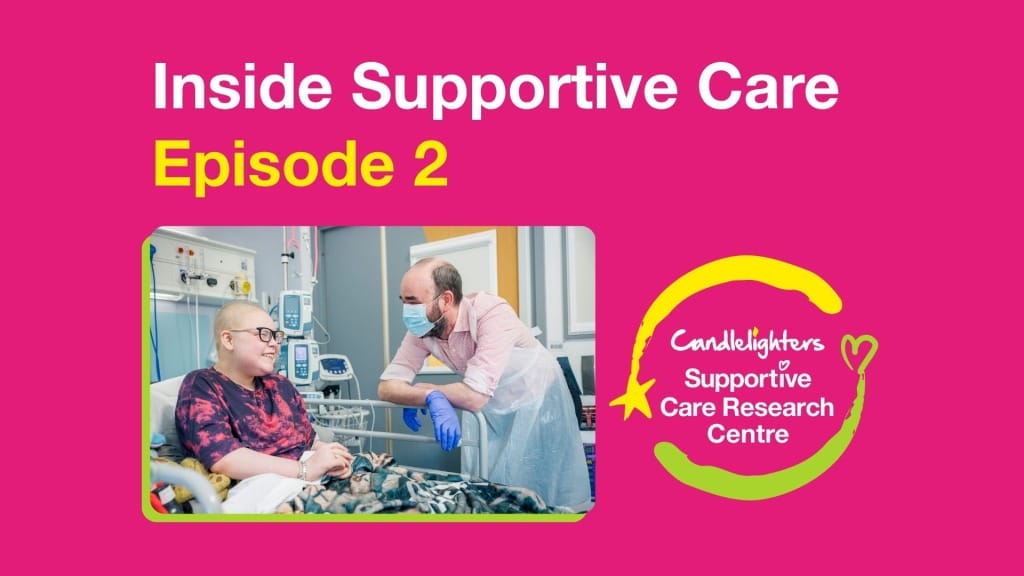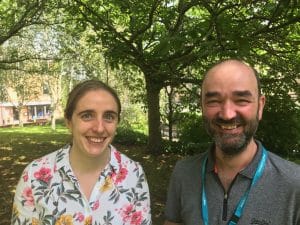In our new video series, ‘Inside Supportive Care’, we’re taking you behind the scenes of the Candlelighters Supportive Care Research Centre.
How the Candlelighters Supportive Care Research Centre is already transforming children’s cancer care
Just 18 months after launching the world’s first dedicated supportive care research centre, we are already seeing meaningful progress in changing how children experience cancer treatment. The centre has driven groundbreaking research, formed strategic partnerships, and enabled critical new studies in children’s supportive cancer care…
From the start, we knew meaningful change requires solid foundations. So, one of our first priorities was to establish strong governance structures and, crucially, to put patient and family involvement at the heart of everything we do. Our Family Involvement Group has been instrumental in shaping our direction. They have helped us focus on real-world challenges that matter most to families, advised on study design and communication, and contributed to national seminars and co-designed workshops. This ensures our research addresses the questions that families most urgently need answered. We have also identified key priorities in managing physical side effects and supporting children with visible differences. All areas where we can make the biggest impact on young people’s quality of life during treatment.

- The Power of Pump-Priming Research
Every breakthrough in childhood cancer care starts with a first step, an idea, a conversation, a question that needs answering. But without core funding, many of these vital first steps never happen. Our pump-priming approach gives researchers the breathing space to explore new ideas, build collaborations, and gather the early evidence needed to unlock major research grants.
The centre is already creating moments that truly matter, moments that don’t just change lives but save them. Dr Jess Morgan, Deputy Director of the centre, was able to attract separate funding of £700,000 to lead an ambulatory (at home) chemotherapy research programme for children. This innovative approach uses mobile backpacks with infusion pumps, allowing children to receive treatment at home rather than in hospital. This programme will develop a child-focused model that reduces hospital stays and family disruption, representing a major step forward in supportive care for young cancer patients.
- Preventing Mucositis
Our work on light therapy treatment for mucositis, the severely painful mouth blistering caused by treatment, is showing promise in preventing these debilitating side effects before they develop. Working with Leeds Dental Institute, we are advancing photobiomodulation (light therapy) as a treatment for mucositis, conducting research to determine the most effective dose, method, and frequency to prevent this painful side effect.
- Neutropic diet
Professor Bob Phillips, Director of the centre, has published new international guidelines showing that restrictive diets don’t actually protect children from infections. This means children can eat a broader range of familiar foods during treatment, helping them feel more normal and maintain better nutrition when treatment affects their appetite.
- Febrile Neutropenia
We have developed research on managing febrile neutropenia (the increased risk of serious infections from cancer treatment), exploring how blood and urine tests can guide treatment and whether a new approach can safely reduce hospital stays and the use of antibiotics.
- Growing Recognition and Impact
The importance of supportive care research is gaining recognition nationally and internationally. Our team has achieved significant academic success with 12 published papers, 4 awards, numerous conference presentations, and contributions to leading international guidelines. This growing recognition helps validate the critical importance of supportive care and opens doors for further research collaborations that will benefit children everywhere.
What’s next?
We have established the centre as a beacon for supportive care research, attracted significant additional funding, and begun studies that will reduce suffering and save lives. Yet we recognise this is only the beginning. The foundation that we have built positions us to maximise our impact as we continue this vital work.
The work we undertake today will determine whether future generations of children face the same harsh treatment experiences or benefit from the kinder, more effective care that our research is pioneering.
Together, we will continue to work towards a world where fewer children die from treatment side effects.




